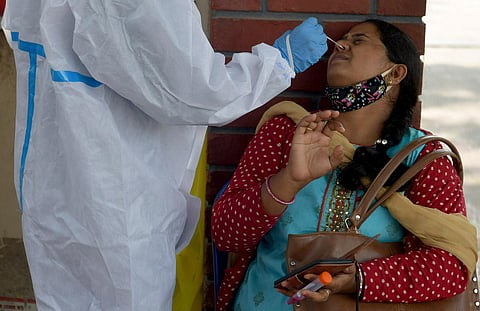

BENGALURU: The course of the pandemic in Karnataka will now be determined by new susceptible pools in closed superspreader venues, experts say. The warning comes in the wake of cluster outbreaks at nursing colleges in Mangaluru and Bengaluru, and an apartment complex in the state capital. Dr C N Manjunath, member of Covid Advisory Committee attributed the rise in cases to the increased movement of people, especially people from Kerala and Maharashtra coming to Karnataka, and the resumption of activities after restrictions were lifted.
“Covid fatigue - reduction in people wearing masks and sanitising their hands - appears to have set in, and it can be really dangerous. However, it is too early to say that this is the onset of a second wave. We must be mindful that the pandemic is still here. Vaccination is taking place at a slow pace. Inoculation of the general public (above age 50, and with comorbidities) will start only next month. Until then, people have to remain vigilant,” he said.
Referring to the cluster cases, senior epidemiologist and member of the Technical Advisory Committee, Dr Giridhara Babu said, “These are superspreader events. As long as there are infections, the risk of superspreader events will be present,” he said.He said that the risk of virus spread in closed spaces such as dining halls, meeting halls, reading rooms in colleges and hostels, club houses in apartments, etc, is high.
Research shows that SARS-CoV-2 can travel about six feet from an infected person, and infect between two and four individuals. So, when people congregate in a place — for worship/shopping/commute/parties/gatherings — the chance of spread multiplies, resulting in a cluster of cases.
A senior doctor said that the size of a disease cluster could vary - from just four cases to as many as 5,000 - and that people who belong to a disease cluster need not have shared space and time.“For instance, someone who picks up the infection from a birthday party may infect a cab driver who picks him up. Such secondary transmissions also belong to the same cluster, with the primary source being the person in the party.
The cluster keeps growing as the driver could infect a family member, the passenger could infect a nurse in a clinic after developing symptoms, and so on. Hence, quick contact tracing becomes extremely important. Every moment wasted will spread the virus further,” the doctor said. Health Commissioner Dr Thrilok Chandra said that the department will intensify contact tracing in the cluster cases. “We’ll soon come up with guidelines to ensure that cases dont rise,” he said.